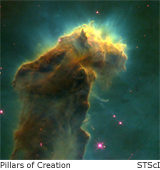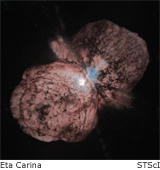Professor

Paul Shapiro

Office: RLM 16.204
Hours: TBA
Phone: (512) 471-9422
email



|
 |
This course will survey a wide range of basic gas dynamics in an astrophysical context.
The conservation equations of hydrodynamics and magnetohydrodynamics
will be derived and studied as in any basic physics course in fluid mechanics.
Hydrostatics, magneto-statics, virial equilibrium, polytropes, sound and MHD
waves, shocks, flux-freezing, kinetic theory, viscosity, and thermal conduction
will be included. Following this, the application to astronomical flows will focus
on the equations of compressible flow at high Reynolds number. We will discuss
steady flows (e.g. stellar winds, accretion, de Laval nozzles as twin-exhaust radio
jets, thermal evaporation of interstellar clouds, steady-state radiative shocks),
self-similar but non-steady flows (e.g. Sedov blast waves for supernova remnants,
cosmological blast waves in an expanding universe, thermal conduction fronts,
interstellar-wind-driven bubbles), and non-steady, non-self-similar flows (e.g. ionization
fronts and H II regions, cosmological pancakes, the heating and ionization
of a cosmological expanding intergalactic medium). We will discuss instabilities
such as the Rayleigh-Taylor, Kelvin-Helmholtz, Jeans, and thermal instabilities,
and the gravitational growth of cosmological density fluctuations, using linear
perturbation analysis. Additional topics include hydromagnetic dynamos and
the generation of cosmical magnetic fields, turbulence, relativistic hydrodynamics,
and an introduction to numerical hydrodynamics.
Prerequisites
Suitable for all beginning and advanced graduate students in astronomy and physics. Otherwise consent of instructor
is required.
Requirements
Homework Problem sets and one end- of-semester student lecture.
A Complete and self-contained set of classnotes will be handed out in place
of a textbook. No exams.
Homework
(1)
|
Lecture note hand-outs will be required reading.
|
(2)
|
Regular homework problem sets will be assigned roughly once per week, due in class one week later
(unless otherwise indicated).
|
(3)
|
A student lecture on a topic to be chosen in consultation with and approved by the professor will be
scheduled for the final weeks of class, and accompanying lecture notes on this topic will be handed in
at this time.
|
Grading
The course grade will be based on the homework problem set grades, the student lecture, and the accompanying
lecture notes.
|


